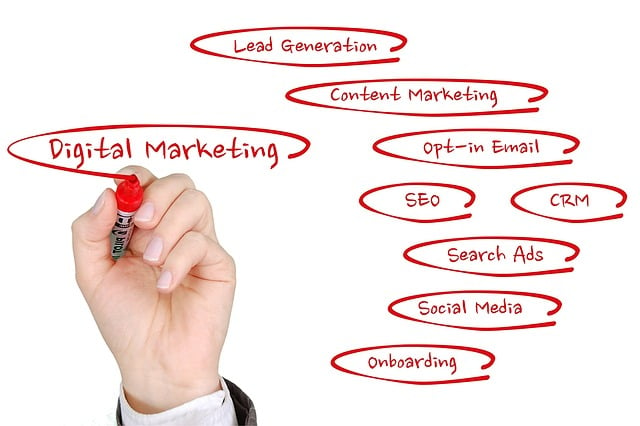The Affiliate Marketing Summit showcases the rapid evolution of the industry due to technological advancements and shifting consumer trends. Marketers leverage data analytics, AI, and influencer collaborations to personalize campaigns, reach broader audiences, and maximize ROI. The summit highlights ethical practices, emphasizing transparency and honest partnerships for long-term success. Emerging technologies like AI and VR are shaping the future, offering innovative strategies for user engagement and data-driven optimization. Sustainable program development through clear communication, trust-building, and incentives is crucial for brand-affiliate relationships.
The Affiliate Marketing Summit brings together industry leaders to explore the future of this dynamic sector. As the digital landscape evolves rapidly, understanding the changing trends in affiliate marketing is crucial for success. This article delves into key aspects shaping the industry, including technological advancements, data analysis, niche collaborations, and ethical practices. We’ll also discuss innovative approaches like AI and VR, providing insights to help businesses build sustainable affiliate programs.
Understanding the Evolving Landscape of Affiliate Marketing

The landscape of affiliate marketing is constantly evolving, driven by technological advancements and shifting consumer behaviors. What was once a niche strategy has grown into a dynamic, global industry, with the Affiliate Marketing Summit serving as a beacon for innovation and knowledge-sharing. As digital platforms continue to expand, so does the diversity of marketing channels—from social media influencers to content creators, each playing a unique role in connecting brands with their target audiences.
This evolution is not just about reaching more people but also about personalization and data-driven insights. Marketers now have access to sophisticated analytics tools that enable them to track performance, optimize campaigns, and deliver hyper-relevant offers. The future of affiliate marketing promises an even tighter integration of technology, where artificial intelligence and machine learning could potentially revolutionize how we perceive and interact with online partnerships, creating a more efficient and effective ecosystem for all involved.
The Role of Technology in Shaping Affiliate Strategies

The digital landscape is continually evolving, and technology plays a pivotal role in shaping affiliate marketing strategies at the Affiliate Marketing Summit. Advanced tools and platforms now enable affiliates to reach wider audiences with pinpoint accuracy, personalizing content for optimal engagement. Data analytics has also become a game-changer, providing valuable insights into consumer behavior and market trends that can inform strategic decisions.
With AI, machine learning, and automation, affiliates can streamline their processes, from identifying niche opportunities to tracking conversions. These technologies empower marketers to create dynamic campaigns that adapt to real-time data, ensuring relevance and maximizing ROI. As the industry moves forward, staying abreast of technological advancements will be crucial for success in affiliate marketing.
Data-Driven Decisions: Analyzing Consumer Behavior Trends

In today’s data-rich environment, affiliate marketing strategies are evolving significantly at the Affiliate Marketing Summit, with a strong emphasis on data-driven decisions. Marketers are increasingly relying on advanced analytics and consumer behavior trends to identify lucrative opportunities and refine their approach. By analyzing vast amounts of data, they can understand customer preferences, online behaviors, and purchasing patterns more accurately. This enables them to create targeted campaigns that resonate with specific audiences, leading to higher conversion rates and improved ROI.
The future of affiliate marketing lies in leveraging data insights to make informed choices. Marketers who stay ahead of the curve by embracing data-driven strategies will have a competitive edge. They can predict trends, adapt quickly to market changes, and personalize content to create a seamless user experience. As technology advances, tools for data analysis become more accessible, empowering affiliates to optimize their campaigns and achieve remarkable results at the Affiliate Marketing Summit and beyond.
Unlocking New Opportunities with Niche Market Collaboration

The future of affiliate marketing lies in uncovering fresh opportunities through niche market collaboration, as highlighted at recent industry events like the Affiliate Marketing Summit. By forging partnerships with specialized influencers and content creators who cater to distinct audiences, brands can access highly targeted consumer segments that were once out of reach. This strategic approach not only expands marketing coverage but also enhances brand credibility by aligning with trusted voices in specific niches.
At these summits, experts emphasize the importance of identifying and engaging with influencers who possess genuine influence over their followers within niche communities. Such collaborations foster authentic connections between brands and consumers, leading to increased conversion rates and loyal brand advocacy. As the landscape of affiliate marketing continues to evolve, staying attuned to industry gatherings like the Affiliate Marketing Summit is essential for marketers aiming to stay ahead of the curve and capitalize on emerging trends.
Ethical Considerations and Transparency in Affiliate Practices

As the affiliate marketing landscape evolves, so do the ethical considerations and transparency practices within the industry. With the rise of digital platforms and diverse consumer behaviors, maintaining integrity in affiliate marketing is more critical than ever. At the core, this includes ensuring that all partnerships and promotions are honest and transparent, providing clear disclosures to consumers about any sponsored content or affiliate links.
The Affiliate Marketing Summit has been a pivotal platform for discussing these ethical guidelines, fostering open dialogue among industry leaders, marketers, and influencers. By promoting best practices, the summit encourages affiliates to maintain high standards, ultimately building trust with their audiences. This focus on transparency not only aligns with consumer expectations but also strengthens the long-term viability of affiliate marketing as a legitimate and respected digital revenue stream.
Integrating Influencer Marketing for Maximum Impact

In today’s digital landscape, where consumer attention is fragmented across various platforms, integrating influencer marketing into affiliate strategies has emerged as a powerful game-changer. The Affiliate Marketing Summit consistently highlights this trend, showcasing how brands are collaborating with influencers to reach and engage audiences in unique and authentic ways. By tapping into the influence of individuals with established online followings, companies can leverage their credibility and trustworthiness to promote products or services effectively.
This approach allows for more organic and targeted promotion, as influencers often have a dedicated niche community that trusts their recommendations. As a result, affiliate campaigns benefit from increased click-through rates and conversion probabilities. The Affiliate Marketing Summit has seen numerous success stories where influencer partnerships have led to substantial growth in sales and brand awareness, solidifying the role of influencer marketing as a key component for maximizing impact in future affiliate strategies.
Future Trends: AI, VR, and the Affiliate Experience

As we peer into the future of affiliate marketing, several emerging technologies are poised to revolutionize the industry, with AI and VR at the forefront. The Affiliate Marketing Summit has consistently highlighted innovation as a key driver for growth, and these trends promise to transform how marketers connect with audiences.
AI is set to enhance personalization on an unprecedented scale, enabling dynamic content generation and hyper-targeted campaigns. Meanwhile, Virtual Reality (VR) opens up immersive marketing experiences, allowing affiliates to create captivating environments that engage users in novel ways. These future-forward strategies not only offer enhanced interactivity but also provide valuable insights through data analysis, further refining the affiliate experience at every touchpoint.
Building a Sustainable Affiliate Program: Key Takeaways

The Affiliate Marketing Summit often highlights trends and insights that are reshaping the industry, with a particular focus on building sustainable affiliate programs. Key takeaways from these discussions underscore the importance of aligning program goals with those of affiliates, fostering long-term relationships based on mutual trust and respect, and providing clear communication channels. By offering competitive commissions, easy-to-use tracking tools, and regular performance updates, brands can incentivize and engage their affiliate partners effectively.
Moreover, leveraging data analytics to understand affiliate performance and customer behavior allows for personalized strategies that drive conversions and grow revenue. Adapting to new marketing channels, such as social media and influencer partnerships, is also crucial. Brands that invest in creating comprehensive resources, including training materials and ongoing support, empower their affiliates to succeed, ultimately strengthening the program’s longevity and success.
